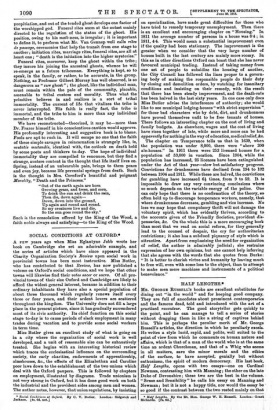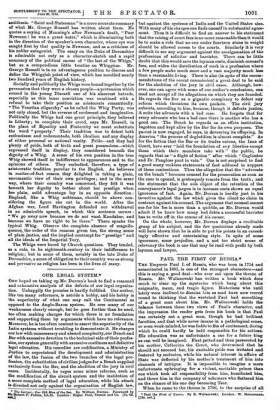HALF LENGTHS.*
MR. GEORGE RUSSELL'S books are excellent substitutes for dining out "in the world" and for keeping good company. They are full of anecdotes about prominent contemporaries and the famous dead, told and introduced with the art of a practised raconteur. The good storyteller gets quickly to the point, and he can manage to tell a series of stories without dragging them in like a string of captives behind him. This is perhaps the peculiar merit of Mr. George Russell's articles, the direction in which he peculiarly excels. He writes a style lucid, rapid, and polite, well suited to the point of view from which he comments on human nature and affairs, which is that of a man of the world who is at the same time an ardent Churchman, and that of a Whig who seems in all matters, save the minor morals and the ethics of the surface, to have accepted, genially but without enthusiasm, the spirit of modern democracy. His last book, Half Lengths, opens with two essays—one on Cardinal Newman, contrasting him with Manning ; the other on the late Duke of Devonshire; these two are the best in the volume. " Sense and Sensibility" he calls his essay on Manning and Newman ; but it is not a happy title, nor would the essay be so good if the contrast between the two rested mainly on that • Half Lengths. By the Rt. Hon. George W. E. Russell. London: Grant Richards. [7s. 6d.]
antithesis. " Saint and Statesman" is a more accurate summary of what Mr. George Russell has written about them. He quotes a saying of Manning's after Newman's death, "Poor Newman ! he was a great hater," which is illuminating both in the direction of the speaker's own character, whose eye was caught first by that quality in Newman, and as a criticism of his nobler antagonist. The essay on the Duke of Devonshire is admirable not only as a character-sketch and a rapid summary of the political career of " the last of the Whigs," but as a compendious little treatise on Whiggism. Mr. George Russell is in an advantageous position to discuss and define the Whiggish point of view, which has moulded nearly two hundred years of English history.
Socially and politically the Whigs were bound together by the persuasion that they were a chosen people—a pretension which roused in the young Disraeli one of his sincerest hatreds, especially as this inner conviction was combined with a refusal to take their position as aristocrats romantically. "The Venetian oligarchy," as he called the Whig Party, was not only closed, but the reverse of exuberant and imaginative. Politically the Whigs had one great principle, they believed in Liberty ; to complete their creed, says Mr. Russell, in the place of Equality and Fraternity we must substitute the word " property." Their tradition was to detest both enthusiasm and rodomontade, both idealism and any display of either personal or national vanity. Pride—and they had plenty of pride, both of birth and great possessions—which expressed itself in display, they considered beneath the dignity of a Whig. A sense of his own position in the true Whig showed itself in indifference to appearances and to the opinions of others. They embodied, therefore, a type of aristocratic tradition peculiar to the English. As believers in matter-of-fact reason they delighted in taking a plain, unromantic view of their own privileges ; and in the same way, where their country was concerned, they felt it was beneath her dignity to bother about her prestige when her plain, solid advantage lay in an opposite direction : England, like a Whig nobleman, should he above con- sidering the figure she cut in the world. After the Afghan war, Lord Hartington defended our withdrawal in an admirable speech, in which this sentence occurs : " We go away now because we do not want Kandahar, and because we have no right to be there." There speaks the typical Whig. Observe the complete absence of magnilo- quence,the order of the reasons given too, the strong sense of plain justice, and the implied contempt for " prestige " and all the ideals of the Imperial Tory.
The Whigs were bored by Church questions. They tended, as a rule, to be eighteenth-century in their indifference to religion ; but in some of them, notably in the late Duke of Devonshire, a sense of obligation to their country was as strong and pervasive as religion has been in the lives of many.



























































 Previous page
Previous page